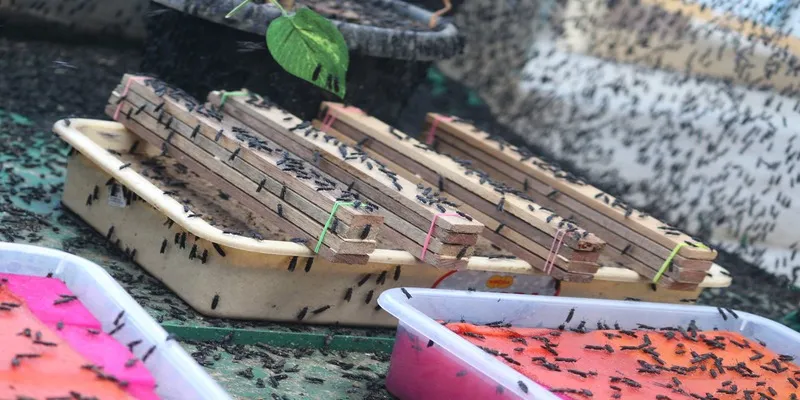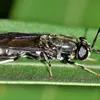With food waste and insects, this biotech startup is debugging the science behind alternative protein
Bengaluru-based biotechnology startup Loopworm is processing a stunning 50 tonnes of food waste every day to create a high-quality feed for Black Soldier Fly (BSF) worms. The protein extracted from the insects is used as a raw material in animal feeds and pet foods.
Almost every minute of Ankit Alok Bagaria and Abhi Gawri’s leisure time at IIT-Roorkee went into understanding how food waste can be valuable. Their enthusiasm, driven by their interest in social entrepreneurship, had developed after they were introduced to the concept of ‘upcycling’ during one of their final year projects.
While flipping through an endless number of reports, the United Nations study (UN) particularly intrigued the duo.
“We came across the concept of an insect-based product market which had already gained traction in the West. Insects are made to feed on food waste/reject which makes them rich in protein, fats, and nutrients, that are then extracted and used as an alternate protein in animal feed and pet food, concentrates, enzymes etc,” says Ankit.
This concept of turning food waste into a valuable resource and bringing it back into the food chain or the ‘food loop’, led to the inception of in 2019.
This Bengaluru-based biotechnology startup has developed a flagship vertical and indoor-based smart insect breeding, production, and processing technology to produce sustainable Black Soldier Fly (BSF) larvae-based proteins and fats. The food waste sourced from processing industries or manufacturers is first converted into high-quality feedstock (via thermal, chemical and biological pre-treatment), and fed to these insects. The accumulated healthy protein and fat are then extracted from these insects and used in different products.
To date, Loopworm has conceptualised B2B products, including protein concentrate used as a raw material in animal feeds and pet foods, protein powder that serves as a natural diet for animals (fish, turtles, and crustaceans, and for use in poultry, farmed fish, and farmed pig diets for superior growth and meat quality), insect oil (used in animal feed and as a raw material in cosmetic products), and insect frass (plant immunity-enhancing soil additive).

Hitting the perfect formula
The R&D phase of Loopworm had started right out of college. Following extensive research, the founders had moved to Delhi, where they were pre-incubated by Nexus Startup Hub at the American Center. Interestingly, the duo carried out their initial experiments with insects and food waste from their rented apartment, keeping things under wrap.
“We used to go around the city, collect food waste and bring it back to our apartment. We deliberately chose the top floor of the building with no lift so that no one could come often, as we had turned our place into a lab! No landlord likes seeing insects being reared on their property,” quips Ankit.
Mealworms, crickets, grasshoppers, and many other “bugs” were experimented upon before Ankit and Abhi zeroed in on BSF Larvae as the perfect solution. The black soldier fly larvae (BSFL) are popularly known to be used to compost waste or convert the waste into animal feed.
By the end of 2019, the startup shifted its base to Bengaluru, where it was more convenient to find and rear the tropical insect.
The period of hit and trial (proof of concept) continued for Loopworm for about 17-18 months. The founders had converted a small cowshed into their insect farming facility, and carried out product development and quality assessment from a Bioinnovation Centre.
“A lot of things need to be set right to get that superior quality protein profile, starting from the quality of the feedstock to climate control. We do not have many experts who have worked with BSF before, and hence we had to do our homework extensively, understand how these insects live and grow in a natural environment and then mimic it by creating a formalised industrial setup for the same. It is like precise farming,” says Ankit.

Breeding and rearing of BSF larvae
Funding, business model, use case
The team has been working on establishing results, and is now looking at the commercialisation of its products by partnering with animal feed and pet food manufacturers. It has a further use case in the cosmetic industry (East Asian market), bio-materials, stimulants, and enzymes, which the startup plans to explore later.
Thai companies like Oricga have introduced a line of Entomocosmetic products (innovative skincare products made from the oils and chitosan of insects) that use the protein oil from agro waste-fed BSF Larvae in various skincare products. US-based Point Insect beauty is another example. The protein oil is considered naturally rich in essential omega fatty acids including 3, 6, and 9 with antimicrobial, antibacterial, and antiviral compounds.
Loopworm has secured grants worth Rs 1 crore in total from the Union and Karnataka governments to support its pilot project. It has also received support from Social Alpha (a venture development platform for science and technology startups).
At present, animal feed manufacturers use a variety of sources of protein as raw materials, including wild marine fishes, sardines (fish meal concentrate), soymeal (poultry) and so on. What would work in Loopworm’s favour is their offering of an alternative sustainable and high-quality protein source/raw material through which customers can now have an additional option besides the usual line of raw materials.
“There are about 350 animal feed and 30 pet food manufacturers who are sourcing somewhat similar raw materials. They are always looking for something new or alternative and good quality sources of protein to upgrade their products. We are playing on innovation in feed formulation with food waste and insects,” says Ankit.
The startup is in talks with seven pet food and five animal feed manufacturers to supply their products and is undergoing commercial trials.
In the future, Loopworm wants to build a decentralised business model of protein production where the four stages of production—breeding and rearing, feedstock preparation, poly houses and product development (bio labs), would be outsourced to progressive farmers and micro-entrepreneurs. They will be facilitated by Loopworm-run mini protein factories, with complete support of inputs and farm monitoring and a buyback guarantee of the produce, says Ankit.
“We are targeting a run rate of $1.5 million in revenue by the end of FY23, and also aim to explore the export markets, including the US and Europe,” he adds. Loopworm has also helped to divert over 60 tonnes of food waste/by-products from landfills to date.
Market analysis and competition
From a business perspective, productivity and quality are the most crucial components that would help Loopworm push ahead of other proteins available in the market. Though the market for insect-based products is extremely limited in India at present, manufacturers are warming up to the concept of alternative proteins for building superior products.
Besides, there is also an urgent need for alternatives, especially sustainable ones. According to the World Bank, approximately 90 percent of global marine fish stocks are now fully exploited or overfished, while 85 percent of the land is already utilised. The prices of fishmeal and soymeal are on a steep rise given their aggressive demand.
Some of the major feed manufacturers in the country are Godrej Agrovet, Cargill India, KSE Limited, Avanti Feeds and Anmol Feed. According to a report by ResearchAndMarkets, the Indian animal feed market is one of the world’s largest and fastest-growing feed markets. The demand is increasingly being fuelled by escalating demand for animal protein, the growth of organised dairy production, a large livestock population and high demand for seafood.
“The insect protein market will soon become mainstream, growing at a CAGR of 40 percent. It is currently a $1.5 billion market, and the use-case/market is already established in some of the Western countries,” says Ankit.
Startups like Proeon (Pune) and Insectifi (Bangalore) are already working in the space and developing similar techniques and products.
Future plans/targets
The startup is on the lookout for equity funding and collaborations, and may soon get investors onboard. While its offerings are around B2B at present, it may explore the B2C segment (pet protein powders, food supplements) in the long run, as the R&D evolves, and it manages to establish necessary volumes in the pet food market.
“We aim to process 20 tonnes of food waste daily in a year. In the long run, we envision becoming one of the largest alternative protein companies in India and globally, and producing 300 tonnes of protein by 2023, while utilising 7000 tonnes of food by-products. We foresee a future where insect-based food would be regarded as ‘superfood’ for large scale consumption by humans and animals alike,” concludes Ankit.
Edited by Anju Narayanan









